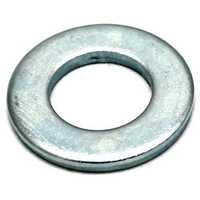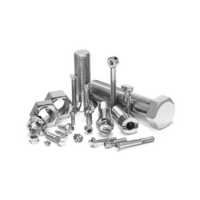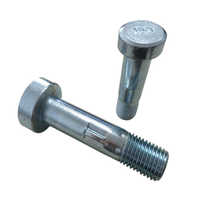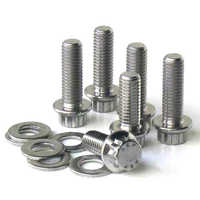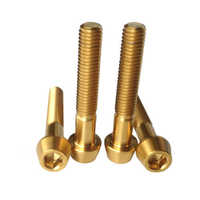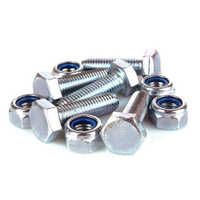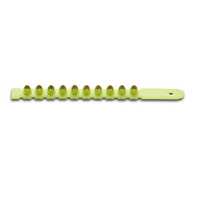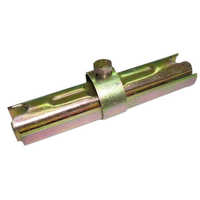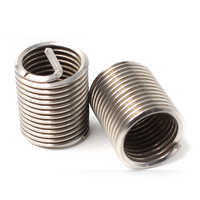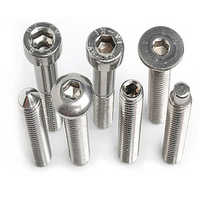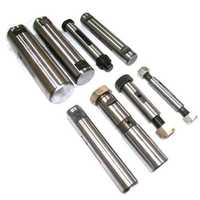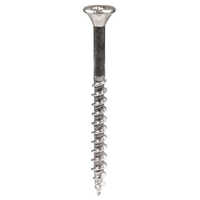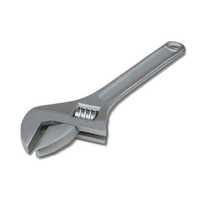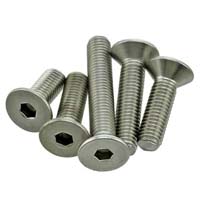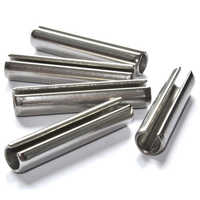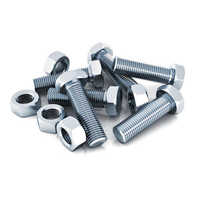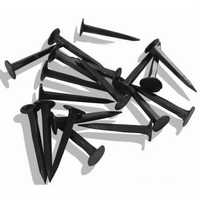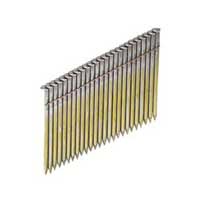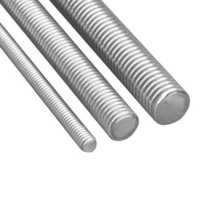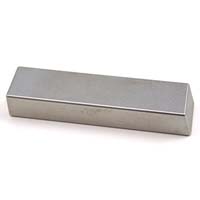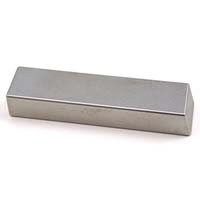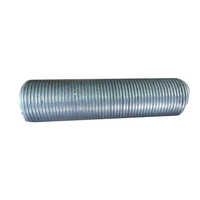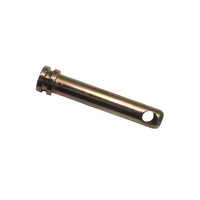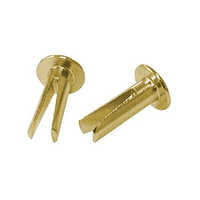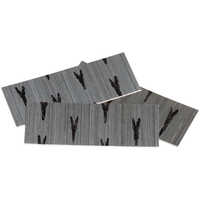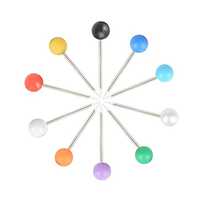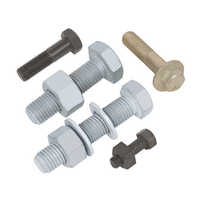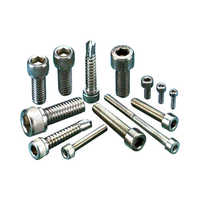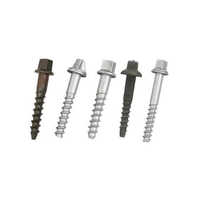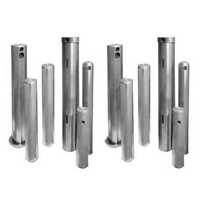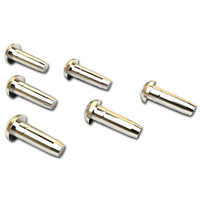Fasteners
(17279 products)
Fasteners encompass a wide range of components used to secure and join materials in various industries. They include bolts, nuts, screws, rivets, and more. Fasteners provide strength, durability, and reliability in applications such as construction, automotive, aerospace, and manufacturing. Their versatility and ability to withstand different stresses and loads make them essential for ensuring the stability and functionality of structures and products.
...show moreSnap Fastener
fittings
Snap Fastener, , 22,lady finger snap fastener
Fasteners
Fasteners ., , 71,automotive turned components anchor fasteners bolt fasteners ss fasteners
Top Fasteners Categories
Explore More Categories
Made in India
Silver Threaded Fasteners
Price: 75 INR (Approx.)/Kilograms
MOQ- 500 Kilograms/Kilograms
Hardness - Hard
Grade - Industrial
Usage - Industrial
13 Years
Associated Industrial Stores
Hex Bolts Size: Different Available
Price: 1000 INR (Approx.)/, Piece
MOQ- 1 , Piece/Pieces
Surface Treatment - Other
Size - Different Available
Product Type - Hex Bolts
3 Years
Jayant Impex Pvt Ltd
Ring Dowel - Application: For Industry Use
Price Trend: 5.00 - 20.00 INR (Approx.)/Piece
MOQ - 5000 Piece/Pieces
Color - Green
Product Type - Ring Dowel
Diameter - 10 Millimeter (mm)
24 Years
Business Type: Manufacturer | Supplier
SPRING INDIA
Stainless Steel Industrial High Tensile Fasteners
Price Trend: 100-1000 INR (Approx.)/Unit
MOQ - 500 Unit/Units
Product Type - High Tensile Fasteners
Surface Treatment - Polishing
Usage - Industrial, Automobile
3 Years
Business Type: Manufacturer | Exporter
UMAA ENGINEERS
Verified Exporter
( Accepts only Foreign Inquiry)
Silver Full Thread Studs
Price: 160.00 INR (Approx.)/Kilograms
MOQ - 20 Kilograms/Kilograms
Surface Treatment - Polishing
Size - Standard
Color - Silver
22 Years
Business Type: Manufacturer | Supplier
NIKO STEEL AND ENGINEERING LLP
Metal Brass Fasteners
Price: 5000 INR (Approx.)/Number
MOQ - 1 Number
Usage - Industrial, Engineering, Manufacturing, Fitting, Furniture, Electronics, Electrical, Compass, Watches, Gears, Valves, Bearings, Plumbing, Marine Industry, etc.
Product Type - Brass Fasteners
Metal Type - Other
3 Years
Business Type: Manufacturer | Distributor
JAYANT IMPEX PVT LTD
Made in India
Ca104 Aluminum Bronze Fasteners Application: All Fittings
Price: 150.00 INR (Approx.)/Kilograms
MOQ - 10 Kilograms/Kilograms
Surface Treatment - Powder Coated
Grade - CA 104 , NES 833 , C63000 ETC
Color - Golden
17 Years
Business Type: Manufacturer | Distributor
GOVIND METAL CO.
Made in India
Brass Knurling Anchor Application: Use For Machine
Price: 35.00 INR (Approx.)/Piece
MOQ - 1000 Piece/Pieces
Feature - Good Quality
Color - Use For Machine
Finish - Polish
19 Years
Business Type: Manufacturer | Supplier
PRIME INDUSTRIAL COMPONENTS LLP
Made in India
Dark Grey Blanking Plugs
Price: 3.00 INR (Approx.)/Unit
MOQ - 1 Unit/Units
Color - Dark Grey, Light Grey, Black.
Grade - Nylon.
Surface Treatment - Other
15 Years
Business Type: Manufacturer | Distributor
VSM PLAST
Made in India
Silver Anchor Rail Fasteners
Price: 25 INR (Approx.)/Piece
MOQ - 100 Piece/Pieces
Grade - A
Surface Treatment - Powder Coated
Usage - Industrial & Commercial
2 Years
Business Type: Manufacturer
RADHE KRISHNA INDUSTRIES
High Design Mild Steel Wire Nail
Price: 60 INR (Approx.)/Kilograms
MOQ - 50 Kilograms/Kilograms
Color - Black
Material - Steel
Application - Construction
6 Years
Business Type: Manufacturer | Distributor
M/S BALAJI RICE MILL
Indian Inquiries Only
Made in India
Xylan Coated Fasteners
Price: 5 INR (Approx.)/Unit
MOQ - 10000 Unit/Units
Standard - DIN / ASME / BS / BS EN ISO /ASTM
Head Type - Hexagonal
Diameter - 6-100 Millimeter (mm)
12 Years
Business Type: Manufacturer | Supplier
Neeta Enterprises
Made in India
Ss Multi Grip Blind Rivet Application: Industrial
Price Trend: 2.00 - 5.00 INR (Approx.)/Piece
MOQ - 1000 Piece/Pieces
Product Type - Multi Grip Rivets
Usage - Construction
Color - Gray
12 Years
Business Type: Manufacturer | Distributor
KETAN ENGINEERING CO
Made in India
Metal Screws
Price Trend: 10.00 - 60.00 INR (Approx.)/Piece
MOQ - 1000 Piece/Pieces
9 Years
Business Type: Manufacturer | Distributor
UNIQUE INDUSTRIALS
Verified Exporter
( Accepts only Foreign Inquiry)
Made in India
Galvanized Round Plain Washers
Price: 45 INR (Approx.)/Piece
MOQ - 1000 Piece/Pieces
Color - Golden
Size - 6 to 12
Usage - Used to protect the mating surface from damage
17 Years
Business Type: Manufacturer | Supplier
RAIL UDYOG
Polished Stainless Steel POP Rivets
Price: 350 INR (Approx.)/Kilograms
MOQ - 1000 Kilograms/Kilograms
Usage - Conveyor Belts
Color - Silver
Product Type - Stainless Steel POP Rivets
4 Years
Business Type: Manufacturer | Supplier
PAL INNOVATIONS (P) LTD.
Made in India
Inconel Nuts And Bolt Application: Pipe Fitting
Price: 20 INR (Approx.)/Piece
MOQ - 10 Piece/Pieces
Hardness - Hard
Usage - Industrial
Finish - Polish
6 Years
Business Type: Manufacturer | Distributor
SHREE RAJLAXMI FORGE
Anchor Fasteners
Price: 15 INR (Approx.)/Piece
MOQ - 1000 Piece/Pieces
Product Type - Anchor Fasteners
Grade - Construction
Surface Treatment - Powder Coated
3 Years
Business Type: Manufacturer | Supplier
KOTHARI INDUSTRIES
Made in India
Titanium Fasteners Grade: Gr.2/Gr.5 And Gr.7
Price: 250 INR (Approx.)/, Kilograms
MOQ - 500 , Kilograms/Kilograms
Grade - Gr.2/Gr.5 and Gr.7
Size - 2 mm to 30 mm
Color - Silver
10 Years
Business Type: Manufacturer | Distributor
NASCENT PIPES & TUBES
Made in India
Solid Copper Rivet Application: Electrical
Price: 850 INR (Approx.)/Kilograms
MOQ - 100 Kilograms/Kilograms
Grade - ELECTROLYTIC
Surface Treatment - Plating, zinc Plating, Nickel Plating, chrome Plating
Color - COPPER
8 Years
Business Type: Manufacturer | Exporter
RAJESH RIVET INDUSTRIES
Made in India
Silver Corrosion Resistant Weatherproof Hexagonal Reducer
Price: 88 INR (Approx.)/Piece
MOQ - 100 Piece/Pieces
Color - Silver
Surface Treatment - Nickel Plating
Product Type - Hexagonal Weather Proof Reducer
5 Years
Business Type: Manufacturer | Exporter
METAL CRAFT INDUSTRIES
Made in India
Industrial Fasteners Application: Fitting
Price: 20.00 INR (Approx.)/Piece
MOQ - 100 Piece/Pieces
Hardness - Hard
Capacity - 280 Kg/hr
Color - Metallic
13 Years
Business Type: Manufacturer | Supplier
Allied Power Solutions
Made in India
Silver Net Hooks
Price: 12 INR (Approx.)/Piece
MOQ - 100 Piece/Pieces
Feature - Good Quality
Grade - A
Color - Silver
9 Years
Response Rate: 78.05%
Business Type: Manufacturer | Supplier
NARAYAN ENGG. CO.
Made in India
Polished Mild Steel Point Coil Nails
Price: 3600 INR (Approx.)/Carton
MOQ - 50 Carton/Cartons
Size - 1/2 Inch
Usage - Used to fastening two objects
Head Type - Round
7 Years
Business Type: Manufacturer | Supplier
RUDANI ENTERPRISES PVT. LTD.
Made in India
Hook Type Fastener Grade: Ms
Price: 12 INR (Approx.)/Piece
MOQ - 100 Piece/Pieces
Product Type - Hook Type Fastener
Surface Treatment - zinc Plating
Color - Zinc Blue & yellow
6 Years
Response Rate: 74.36%
Business Type: Distributor | Exporter
NANDIKA FASTENERS
Wire For Nails Application: Household
Price: 55 INR (Approx.)/Kilograms
MOQ - 100 Kilograms/Kilograms
Grade - Different grade available
Surface Treatment - Polishing
Product Type - Wire Nails
5 Years
Business Type: Manufacturer | Supplier
BEDMUTHA INDUSTRIES LIMITED
Made in India
SS Fastener
Price: 10 INR (Approx.)/Piece
MOQ - 10000 Piece/Pieces
Product Type - SS Fastener
Grade - brass, ms, ss
Usage - Industrial, electrical, etc
6 Years
Business Type: Manufacturer | Exporter
NATIONAL COMPONENTS
Made in India
Anchor Bolt - Application: Industrial
Price: 10 INR (Approx.)/Unit
MOQ - 500 Unit/Units
Usage - Construction
Color - Gray
Product Type - Anchor Bolt
13 Years
Business Type: Manufacturer | Supplier
GOLDEN MACHINEX CORPORATION
Indian Inquiries Only
Golden Brass Stainless Steel Inserts
Price: 20 INR (Approx.)/Piece
MOQ - 500 Piece/Pieces
Usage - Industrial
Color - Golden
Surface Treatment - Polishing
7 Years
Business Type: Manufacturer | Supplier
VINAY ENGINEERING COMPANY
Made in India
Industrial Stainless Steel Step Ejector Pin
Price: 75 INR (Approx.)/Piece
MOQ - 500 Piece/Pieces
Surface Treatment - Other
Color - Silver
Product Type - Stainless Steel Step Ejector Pin
6 Years
Business Type: Manufacturer | Distributor
VE TO CLAMPING SYSTEMS PRIVATE LIMITED
Fasteners Manufacturers | Suppliers in India
| Company Name | Location | Member Since |
|---|---|---|
| Spring India | Mumbai, India | 24 Years |
| Niko Steel And Engineering Llp | Mumbai, India | 22 Years |
| Prime Industrial Components Llp | Jamnagar, India | 19 Years |
| Govind Metal Co. | Ahmedabad, India | 17 Years |
| Rail Udyog | Howrah, India | 17 Years |
| Vsm Plast | Pune, India | 15 Years |
| Allied Power Solutions | Delhi, India | 13 Years |
| Golden Machinex Corporation | Kolkata, India | 13 Years |
| Neeta Enterprises | Mumbai, India | 12 Years |
| Ketan Engineering Co | Mumbai, India | 12 Years |
Fasteners
The majority of today's machinery is composed of a number of individual components that, when put together, form a whole that is fully functional. On the other hand, these components of the machine often produce enormous forces and are subject to vibrations that are sufficient enough to cause the parts to become disassembled and the machine to fail. The use of fasteners, which are crucial parts of hardware, helps to reduce this difficulty by attaching two or more components together in a single assembly. Fasteners, on the other hand, are available in a wide variety of types, and each of those types is best suited to a particular set of uses.
Types of Fasteners and How to Choose Them
The term "fastener" refers to any piece of hardware that can be used to join two or more separate components together in a mechanized manner. There are many different kinds of fasteners, which are typically made of metal and can be broadly categorized as either permanent or temporary fasteners. Permanent fasteners are designed to create a joint between two components that are intended to be there permanently. These devices are single-use, which means that you can only use them once due to the fact that removing these fasteners would destroy them. Temporary fasteners, on the other hand, provide simple removal and reuse while providing a level of strength that is equivalent to that of permanent fasteners or even superior. The following are the five most common types of fasteners:
Screws: A screw is a type of temporary fastener that consists of a head and shank that both have threads that are extremely sharp. To use a screw to link two components together, you would first need to insert the screw into the pieces using a screwdriver. After that, you could then attach the two parts together.
Bolts: External threads, also known as male threads, begin at the tips of bolts, just as they do with screws. Bolts have a structure that is comparable to that screws. However, in contrast to screws, bolts do not have a self-threading feature (they do not cut threads into the material). Instead, in order to engage and establish mechanical connections, they need prepared pieces (like nuts) and pre-tapped holes. The most common kinds of bolts are detailed in the following list.
Nuts: A threaded hole, also known as female threads, is located in a nut, which is a kind of fastener that is normally used in conjunction with a matching bolt to create a bolted connection. The ability to build large machines while yet benefiting from the great strength and simplicity of installation offered by nuts and bolts is a significant advantage offered by employing these types of fasteners (and removal).
Washers: Washers are metal discs that are circular in shape and are used in combination with nuts and bolts. They contribute to the reduction of friction and provide an equal distribution of load from nuts and bolts on the portion that is being secured. Plain washers and spring washers are the two kinds of washers that are available. The form of a plain washer is a disc with a hole in the center. These washers are also referred to as flat washers. They are the form of washer that is used the most often, particularly in situations where the sole need is to guarantee that nuts and bolts on components have an equal distribution of load.
Rivets: Permanent fasteners known as rivets have a shaft that is designed to be put into pre-existing holes in order to bind two or more components together. When you enter a rivet into the parts that you wish to put together, it will generate a permanent head at the other end, which will prevent the rivet from being removed.
How Fasteners Are Made
Although fasteners may be found in a dizzying array of sizes and contours, the fundamental manufacturing process is, for the most part, the same across the board. First, the steel wire is cold-forged into the desired form, then it is heat-treated to enhance its strength, and last, it is surface-treated to improve its durability, and only then is it packaged and ready for shipping. On the other hand, the manufacturing process may need a greater number of extra processes in order to accommodate more complex bolt designs:
1. The process of cold forging begins with the uncoiling and subsequent cutting to the desired length of massive steel wire rods. The grade of steel used in all products manufactured in the industry is standardized in accordance with the standards of ISO 898-1. After that, the wire is cold-forged into the desired form by using specialized equipment. In this process, the steel is shaped while it is still at room temperature by passing it through a sequence of dies while the pressure is turned up to a high level. The actual tooling may be rather complicated; it may consist of up to 200 separate pieces, each of which must adhere to tolerances that are measured in hundredths of a millimeter. Cold forging, once the technique has been developed, enables bolts may be manufactured fast, in huge numbers, and with a high degree of homogeneity.
2. The act of subjecting the bolt to temperatures so high that the steel is caused to become more brittle is known as heat treatment, and it is a routine procedure for all types of fasteners. When the steel is softer, cutting or rolling are often used to apply to the thread prior to heat treatment. The process of rolling is quite similar to that of cold forging; it entails passing the bolt through a die in order to form and shape the steel into threads. Threads are formed by the process of cutting and extracting steel from the material.
Factors that Can Affect Fasteners Working
Some of the things that may have an effect on how well fasteners operate are as follows:
What is the purpose of using the fastener? The first thing that should be thought about is the purpose that both the fastener and the product itself will serve. For instance, if the fastener is opened and closed often, it would make sense to choose a solid metal fastener that is both sturdy and reliable. If a fastener is opened very seldom, if at all, a less expensive option, such as plastic, could be appropriate.
Where is the fastener being used? The kind of fastener that your product could require is determined in part by environmental considerations. It is possible for fasteners that are used inside in settings that are not demanding to be less resistant than those that are used outside or in an environment that is harsher. Consider additionally special environmental needs.
How do I determine which type of fastener I need? You are aware that there are many different kinds of fasteners available, and that each type of fastener has several different variants within itself. For instance, you have the option of selecting screw heads with a variety of various shapes and designs. There are many different kinds of nuts, such as hex nuts, cap nuts, acorn nuts, jam nuts, flange nuts, square nuts, tee nuts, torque locks, k-locks, slotted nuts, connection nuts, and castle nuts.
Which type of material should I use? You should also be able to choose the appropriate material for your fasteners with the assistance of knowing how and where the fastener will be utilized. The choice of material has an effect not only on the cost of the fastener but also on its resistance to corrosion and its level of strength.
Which type of coating is appropriate? Coatings are frequently applied to fasteners in order to increase their resistance to corrosion. However, in some instances, coatings serve no purpose other than to add aesthetic value.
What is the appropriate measurement? The size of the fastener is also determined by the manner in which it is utilized as well as the environment in which it is used. Applications that demand a heavier load may call for bigger fasteners, while designs that are more compact may call for smaller ones.
What is fastener and when to use them?
A mechanical connection between two or more things may be made with fasteners, and this connection can be made either permanently or temporarily. There is a wide variety of distinct kinds of fasteners, each serving a particular function. Due to the simplicity with which they may be inserted and removed as necessary, threaded fasteners are among the most widely utilized when it comes to the process of putting components together. Bolts, screws, and studs are the three primary kinds of threaded fasteners that are often used. When clamping two or more pieces together, nuts and bolts are often used in combination with one another. The hexagonal nut is the most common sort of nut, although there are many other varieties of nuts that may be used for a variety of purposes. It is usual practice to place a washer between the head of a bolt, screw, or nut and the material that is being clamped by the fastener. Rivets are a kind of permanent fastening, meaning that once they have been removed from their position, they cannot be used again. Rivets have a wide variety of uses and businesses that make use of them, but the most prevalent usage is in the joining of metal sheets and plates.
Buy Fasteners Online
Purchasing fasteners in bulk quantity is very convenient with the availability of a number of fasteners manufacturers in India. Buyers can connect with the fastener manufacturers and fastener suppliers, Washers suppliers, etc.. Interested buyers may also check other available sub-categories including:
- MS Bolt
- Brass Bolts
- Cap Head Bolt
- Custom Hex Head Bolts
- Titanium Fasteners
- Stainless Steel Bolts
- Quick Release Fasteners
- Roofing Screw
- Ball Screws & Lead Screws
Buyers can contact suppliers and send their purchasing needs of different types of fasteners.
FAQs: Fasteners
Q. Why fasteners are so commonly used?
Ans. Fasteners are widely used hardware product in almost every walk of life. Everywhere people come across machines, equipment, devices, apparatus and appliances which all use one or the other types of fastener.
Q. What is a hex nut?
Ans. A hex or hexagonal nut has a hexagonal-shaped construction whit female thread inside. The nuts are fastened with a corresponding-sized wrench to a bolt.
Q. What are the materials in which fasteners are made?
Ans. Fasteners are made in different types of materials, such as steel, nickel, aluminium, brass, titanium, iron and alloy steel among others.
Q. Where can buyers find trusted manufacturers of fasteners?
Ans. Buyers can check out B2B portals to get a list of fastener manufacturers and place their purchasing requirements.
Q. What is the advantage of a screw over a nail?
Ans. Screws have firm holding capacity than nails. In addition, screws can be easily removed by unscrewing and can be reused but this is not the case with nails. Technically nails become dysfunctional when removed while screws can be fixed on the same slot once again.
Q. What are examples of fasteners?
Ans. Some examples of fasteners are nuts, bolts, rivets, washers, etc.
Q. What is the difference between fasteners and bolts?
Ans. A bolt is a fastener with really no tapered end that is frequently used in combination with washers and nuts. A screw is a kind of tapered fastener that either fits into an already existing thread in a material or, as it rotates, makes its own thread in the material.
Q. What is another word for a fastener?
Ans. A few different words for fasteners are screws, clasps, buckles, bolts, etc.
Q. What is the most common fastener?
Ans. Fasteners come in a variety of forms, the most common of which is the bolt. These mechanical components are often used to join two unthreaded parts. On one end of a bolt is a hexagonal head, and the other end of the bolt has external male threads. On the opposite end of the bolt, there is typically a nut that is used to secure it.
Related Topic:
Top 10 Fasteners Manufacturers, Suppliers & Exporters in India
Related Categories
Abrasives
Acoustic Products
Acrylic Sheets
Air Blowers
Air Compressors & Air Separation Plants
Air Cooler
Air Dryers
Air Receiver
Air Valves
Aluminum Castings
Anchors
Anti Vibration Mounts
Ball & Roller Bearings
Ball Valves
Ballast Making Machines
Bearing Parts & Components
Bearings
Bellows & Expansion Joints
Belt Pulleys
Boilers, Components & Spares
Bolts
Bright Bars
Bristles
Burners/Industrial Burners & Incinerators
Bushings & Bushing Parts
Butterfly Valves
CNC Machined Components
Cable Pulleys
Capital Goods
Carbon & Graphite Products
Castor Wheels
Centrifugal Pumps
Centrifuges
Ceramics
Chains & Chain Link Fence Fittings
Cleaning Equipment
Clips, Clamps
Coils
Combustion Equipment
Compression Springs
Compressors & Allied Equipment
Control Valves
Conveyor & Conveyor/Industrial Belts
Cooling Tower & Chilling Plants
Corrosion Protection Materials
Coupling
Cranes
Cryogenic Equipment
Cutting Tools, Broaches & Cutters
Departmental Shelving
Diaphragm Valves
Die Castings
Dies & Moulds
Dies,Jigs,Fixtures
Diesel Engine & Electric Locomotive Spares
Draught Fan
EOT Cranes
Electric Hoists
Electric Motors & Engines
Electroplating Chemicals & Equipment
Elevators, Lifts & Escalators
Energy Management System
Engine Valves
Engineering Goods & Equipment
Engineering Plastics
Engraving Equipment
Extruded Profiles
Fasteners
Fiberglass Products
Filter Cartridges & Media
Filter Cloth, Filter Industrial
Filters-Air, Gas, Liquid
Filtration & Sedimentation Units
Flat Metal Processing Equipment
Float Valves
Fork Lift Truck Parts
Fork Lift Trucks
Forklifts
Foundry Raw Material & Equipment
Furnace Manufacturers
Galvanized Fasteners
Gantry Cranes
Gaskets
Gate Valves
Gauges & Gauge Glasses
Gear Boxes, Reduction Gears & Gear Cutting
Girder Cranes
Glass & Glass Products
Glass Cutting Tools/Glass Cutters
Globe Valves
Goliath Cranes
Grating
Hand & Allied Tools
Hand Pump
Hardware & Tools
Heat Exchangers
Heating Elements
Hex Bolts
Hex Nuts
Hooks & Mounts
Hoses
Hot Air Oven
Humidification & Ventilation Equipment
Hydraulic Hoses & Flexible Metal
Hydraulic Press
Hydraulic Press Brakes
Hydraulic Products & Equipment
Hydraulic Valves
Induction Heating Equipment
Industrial Automation
Industrial Brakes
Industrial Brushes
Industrial Clothing
Industrial Clutches
Industrial Cylinders
Industrial Dryers
Industrial Evaporators
Industrial Knives
Industrial Nets
Industrial Ovens
Industrial Rollers
Industrial Supplies Stocks
Industrial Supplies-General
Industrial Tape
Industrial Tools
Industrial Valves
Industrial Vibrator
Inspection Equipment
Instrumentation
Internal Combustion Engine
Jib Cranes
Laboratory Furniture
Laboratory Glassware & Equipment
Laundry Equipment
Lined Valves
Machine Tools Accessories
Marking Systems
Material Handling Equipment
Measuring Tools & Equipment
Mechanical Seals
Metallised Capacitor Films
Mining Equipment
Mining, Exploration & Drilling Machinery
Model Making Materials
Motor Couplings
Moulded Components
Moulds
Needle Valves
Needles
Nuts
Oil Seals
Outdoor Cooling Systems
Overhead Cranes
PVC Hoses
PVC Products
Paint Brushes
Painting Equipments & Maintenance
Perforated Sheets
Plastic Processing Machinery Parts
Plastic Valves
Plastic Welding Equipment
Plate Valves
Plug Valves
Pneumatic Products & Tools
Pneumatic Valves
Polish & Polishing Material/Machinery
Power Press
Precision Brass Components
Pressed Components
Pressure Gauges
Pressure Vessels
Pulleys
Pulverizers
Pump Spares Parts
Pumps & Pumping Equipment
Radiators
Refrigeration & Equipment
Rope Pulleys
Rope,Twines & Webbings
Ropes
Rotary Valves
Rubber & Rubber Products
Rubber Gaskets
Rubber Roller
Rubber Seals
Rubber Transmission Belts
Screws
Seals
Sensors & Transducers
Shaft Couplings
Shafts & Shaft Collars
Sheet Metal Components & Parts
Solenoid Valves
Springs
Stainless Steel Bolts
Stainless Steel Fasteners
Stainless Steel Nuts
Stainless Steel Valves
Storage Systems
Storage Tanks
Submersible Pumps
Surface Finishing Equipment
Synthetic Industrial Diamonds
Testing & Measuring Equipment
Thermostatic Bimetals & Thermostats
Trolleys & Carts
Tungsten Carbide
Ultrasonic Equipment
V-Belts
Vacuum Equipment & System
Valves
Valves Fittings
Vibrating Screen
Washers
Water Coolers
Weighbridge
Welding & Soldering Supplies
Welding Electrodes
Welding Equipment
Winches
Wire Drawing Dies
Wire Rope Hoists
Wire Ropes


